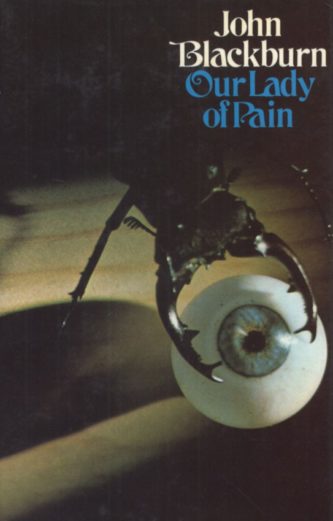 By JOHN BLACKBURN (Jonathan Cape; 1974)
By JOHN BLACKBURN (Jonathan Cape; 1974)
This is said to be the darkest novel by England’s late John Blackburn, who during his lifetime wrote quite a few eccentric horror/mystery novels like A SCENT OF NEW-MOWN HAY, CHILDREN OF THE NIGHT, BURY HIM DARKLY and FOR FEAR OF LITTLE MEN. OUR LADY OF PAIN is an ideal example of Blackburn’s unique brand of horror, being lively, entertaining and thoroughly unpredictable.
It begins as a whodunit, with crime reporter Harry Clay drawn into a series of crimes involving people deranged by the (symbolic) inhabitants of Room One Hundred and One, identified in George Orwell’s 1984 as containing every person’s worst fear. Harry teams up with Miriam, a babe doctor who helps him in his investigation, leading him to an old mansion where all the crimes appear to be centered.
At this point the story becomes a haunted house chiller, with Harry investigating the abode’s history and discovering that it once housed a little girl who was hidden from the world due to a hideous deformity. Yet what Harry discovers when he investigates the house, namely an eyeless skeleton, would seem to contradict that conclusion.
From there the proceedings transform yet again, climaxing in a packed theater where a renowned actress is set to portray the notorious Countess Bathory, who allegedly murdered and bathed in the blood of hundreds of teenage virgins. Lady Bathory, it turns out, has a definite connection to Harry’s investigation, through a supernatural Magoffin that’s unquestionably one of the most unique I’ve encountered in any novel. There’s also a memorably nasty final twist that amply justifies the book’s title.
In its interweaving of history, folklore and the supernatural within a fast paced mystery framework, OUR LADY OF PAIN is drafted with smoothness and ingenuity. It may be a bit overcomplicated, with what is almost certainly the busiest, most wide-ranging narrative this side of GRAVITY’S RAINBOW (and with a third of the page count), but Blackburn pulls it off nonetheless, and does so with considerable vigor.
